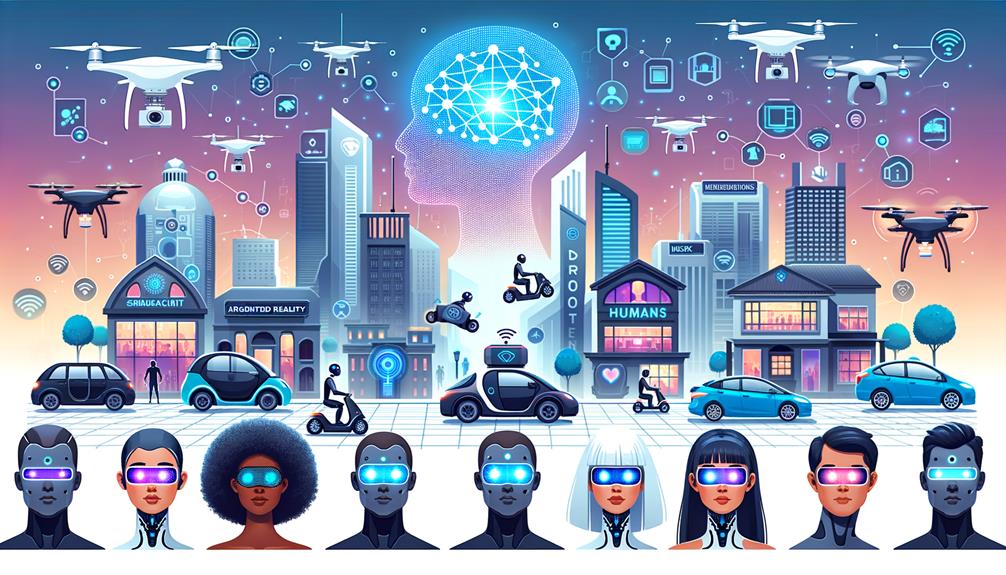

Ya estás viviendo con la IA, te des cuenta o no. Asistentes digitales gestionar su agenda y sus tareas, mientras recomendaciones personalizadas mejorar sus experiencias de compra y entretenimiento. Dispositivos domésticos inteligentes controlan su espacio vital, y las aplicaciones de navegación le ayudan a evitar los atascos. La IA también industrias transformadoras como la educación, la sanidad y las empresas, haciéndolas más eficientes y eficaces. A medida que la IA sigue evolucionando, va configurando las normas y prácticas sociales del futuro. Hasta ahora solo ha visto un atisbo del impacto de la IA en su vida cotidiana, pero aún le queda mucho por descubrir. inteligencia artificial[1] está cambiando el mundo.
Es probable que la IA influya en su vida cotidiana de más formas de las que imagina, desde las asistentes digitales que le ayudan a gestionar su agenda al recomendaciones personalizadas que dan forma a sus experiencias de entretenimiento y compras.
Los algoritmos de IA aprenden constantemente y se adaptan a tus hábitos, haciendo que tus interacciones diarias con la tecnología sean más personalizadas y eficientes.
Los dispositivos inteligentes para el hogar, por ejemplo, le permiten controlar la iluminación, la calefacción y los sistemas de seguridad con facilidad, haciendo su vida más cómoda.
A medida que avanza su día, la inteligencia artificial aplicaciones de navegación te ayudan a navegar por el tráfico, mientras que asistentes digitales como Siri y Alexa responden a tus órdenes de voz.
En integración perfecta de la IA en su vida cotidiana está cambiando su forma de interactuar con la tecnología.
Aprovechando las vías AI ya está influyendo en la vida cotidiana, también está produciendo numerosos beneficios que están transformando el funcionamiento de las empresas, el trabajo de las personas y la vida de los individuos.
Con la IA, se observan mejoras significativas en eficacia en diversos sectores, lo que podría impulsar PIB mundial en $15,7 billones para 2030. También se está beneficiando de una mayor precisión en procesos decisorioslo que reduce los costes operativos de las empresas.
Las recomendaciones personalizadas basadas en IA están mejorando tu experiencia del cliente[2]para que le resulte más fácil encontrar lo que busca. Además, la IA está creando nuevas oportunidades de empleo en tecnología y campos afines.
A medida que la IA siga integrándose en los procesos empresariales, puede esperar ver soluciones aún más innovadoras que impulsen el crecimiento, mejoren la comodidad y aumenten la productividad.
La IA está transformando el panorama de los medios digitales al aprovechar el comportamiento y las preferencias de los usuarios para crear experiencias a medida que aumentan la participación y la satisfacción.
Seguro que conoce recomendaciones de contenidos personalizadas en plataformas como Netflix y Spotify, que utilizan Algoritmos basados en IA para analizar tu comportamiento y sugerirte contenidos que resuenen contigo.
Tecnologías de procesamiento del lenguaje natural, como chatbots y asistentes virtualestambién se utilizan para facilitar interacciones fluidas entre los usuarios y los medios digitales.
Además, se están empleando herramientas de IA en producción de medios digitales para crear personajes y entornos realistas mediante técnicas avanzadas de CGI.
También se están utilizando modelos de aprendizaje automático para detectar y filtrar contenido nocivo en las redes sociales, mejorando la experiencia y la seguridad de los usuarios.
Estas innovaciones están revolucionando la forma de consumir e interactuar con los medios digitales.
Numerosas instituciones educativas de todo el mundo están aprovechando el poder del inteligencia artificial para crear experiencias de aprendizaje más personalizadas, eficientes y eficaces para los estudiantes.
Encontrará plataformas impulsadas por IA que transforman los programas de grado y diploma integrando tecnologías de aprendizaje adaptativoLa educación, más accesible y eficaz.
Gracias a la IA, conseguirás información en tiempo real, lo que permite a los educadores realizar los ajustes oportunos en los métodos de enseñanza y el plan de estudios para apoyarle mejor.
La IA también personaliza las experiencias de aprendizaje analizando los datos individuales de los estudiantes, creando planes de aprendizaje a medida para satisfacer necesidades diversas. Se espera que esto mejore en gran medida el compromiso y los resultados de los estudiantes.
Como el demanda[5] de profesionales cualificados en IA y ciencia de datos, las instituciones están incorporando Cursos relacionados con la IA en sus planes de estudios para prepararte para futuros mercados de trabajo.
En mercado laboral está en la cúspide de una transformación significativa, con la tecnología sustituyendo ciertas funciones y creando al mismo tiempo nuevas oportunidades que requieren un conjunto diferente de competencias.
Notarás que Automatización basada en IA que afectan a casi un tercio de las tareas que realizan actualmente los empleados, y los trabajos manuales se enfrentan a mayores riesgos en comparación con los puestos cualificados.
A medida que avanzan las tecnologías de IA, la demanda de especialistas en aprendizaje automáticoLos analistas de datos y los puestos relacionados con la inteligencia artificial aumentarán.
Para adaptarse, tendrá que mejora y reciclaje profesional para prosperar en este mercado laboral en evolución.
En las próximas dos décadas, es posible que se sustituyan 7 millones de puestos de trabajo, pero 7,2 millones nuevas funciones transformando la mano de obra.
Mientras navega por el cambio impulsado por la IA en el mercado laboral, también tendrá que contemplar las implicaciones más amplias de estas tecnologías en la sociedad, donde las preocupaciones sobre sesgo algorítmico[3]La inteligencia artificial, la privacidad de los datos y la rendición de cuentas están suscitando importantes debates sobre ética. Hay que considerar cómo los sistemas de IA pueden perpetuar los prejuicios sociales existentes si no se diseñan con cuidado, y cómo la transparencia en los procesos de toma de decisiones es necesaria para la confianza pública.
| Consideraciones éticas en la IA | Implicaciones | Acciones necesarias |
|---|---|---|
| Sesgo algorítmico | Perpetúa los prejuicios sociales | Diseño y control minuciosos |
| Protección de datos | Uso indebido por empresas y gobiernos | Sólida normativa de protección de datos |
| Rendición de cuentas | Falta de transparencia y confianza | Procesos claros de toma de decisiones |
| Directrices éticas | Alinear la IA con los valores humanos y los objetivos sociales | Creación y aplicación de directrices |
| Objetivos sociales | Garantizar que la IA sirve al interés público | Fomentar el desarrollo responsable de la IA |
Está entrenado con datos hasta octubre de 2023.
Aprovechando El poder de la IApuede transformar las operaciones de su empresa, automatizando las tareas rutinarias y obteniendo importantes mejoras de eficiencia que impulsarán sus resultados.
Reducirás costes operativosAlgunas empresas los han reducido hasta 30%.
Los análisis basados en IA le ofrecen información en tiempo real en su empresa, permitiendo una mejor previsión y toma de decisiones basadas en patrones de datos.
Gracias a la inteligencia artificial, mejorará cliente[6] experiencia a través de la personalización, haciendo que los consumidores 80% tengan más probabilidades de comprarle.
Además, la IA optimiza su inventario, reduciendo el exceso de existencias y mejorando los plazos de entrega.
En general, la IA maximiza la eficaciaLa reducción de los residuos y el aumento de la rentabilidad de su empresa.
A partir de los aumentos de eficiencia y los resultados empresariales que consiga aprovechando el poder de la IA, verá cómo surgen aún más oportunidades a medida que el mercado mundial de la IA se dispara hasta alcanzar los $190.000 millones previstos para 2025.
A medida que profundice en el futuro de la inteligencia artificial, descubrirá tecnologías emergentes como la computación de borde, que permitirá un procesamiento más rápido de los datos y la toma de decisiones con IA.
La investigación actual sobre IA se centra en resolver los problemas de parcialidad, transparenciay la privacidad de los datos, garantizando que el impacto de la IA en la vida cotidiana sea positivo.
Cabe esperar que la IA se integre cada vez más en la vida cotidiana, impulsando la innovación y la productividad.
El futuro de la IA se presenta brillante, por lo que tendrá numerosas oportunidades de explorar nuevas aplicaciones y avances.
Aunque el impacto de la IA se está dejando sentir en diversos sectores, sus aplicaciones en la sanidad son especialmente transformadoras y están revolucionando la forma en que los profesionales médicos diagnostican, tratan e interactúan con los pacientes. Usted se beneficia de una mayor precisión diagnóstica, ya que los sistemas de IA superan a los radiólogos humanos en la detección de enfermedades como el cáncer de mama. Los algoritmos basados en IA hacen posible la medicina personalizada, adaptando los planes de tratamiento a los perfiles genéticos individuales.
| Aplicación AI | Descripción | Impacto |
|---|---|---|
| Precisión diagnóstica | Diagnóstico asistido por IA | Precisión de hasta 94% |
| Medicina personalizada | Planes de tratamiento personalizados | 30% eficacia mejorada |
| Telemedicina | Consultas virtuales | 150% aumento del acceso |
| Procesamiento del lenguaje natural | Racionalización de las tareas administrativas | 30% reduce la carga de trabajo del clínico |
| Descubrimiento de fármacos | Análisis basados en IA | Identificación más rápida de fármacos candidatos |
Con la IA, se obtienen diagnósticos más precisos, tratamientos más eficaces y una asistencia sanitaria más accesible.
En Influencia de la IA se extiende a casi todos los rincones de tu vida, su lado más oscuro comienza a emerger, planteando riesgos importantes y retos que amenazan con socavar sus numerosos beneficios.
Es probable que te encuentres con sistemas de IA que perpetúan sesgosque conducen a resultados discriminatorios en ámbitos como el reconocimiento facial y la contratación.
Su datos personales también está en peligro, ya que la dependencia de la IA de grandes conjuntos de datos plantea importantes problemas de privacidad.
La rendición de cuentas es otro reto, sobre todo con aplicaciones autónomas de IA como los coches autoconducidos.
Además, el impacto medioambiental de la IA es cada vez mayor, y los grandes modelos consumen cantidades ingentes de energía y aumentan las emisiones de carbono.
A medida que la IA sigue evolucionando, es crucial abordar de frente estos riesgos y desafíos para garantizar que sus beneficios se distribuyan equitativamente y se mitiguen sus consecuencias negativas.
"A medida que tejes el tapiz de la vida, los hilos invisibles de la IA enriquecen tu rutina diaria, proporcionando una comodidad sin fisuras, mejorando la comunicación, controlando la salud, revolucionando la educación y electrizando el entretenimiento, convirtiendo cada momento en una experiencia fascinante."
Ya está experimentando el impacto de la IA, pero verá aún más cambios con la ética emergente de la IA, el aumento de la automatización del trabajo, la expansión del aprendizaje personalizado, las soluciones sanitarias innovadoras y los hogares más inteligentes que se anticipan a sus necesidades y se ajustan en consecuencia.
Probablemente esté utilizando la IA en su vida diaria sin darse cuenta. Puedes aprovechar la ayuda de la IA para casas inteligentes, gestión de finanzas personales, control de la salud y aprendizaje virtual, haciendo tu vida más fácil y eficiente cada día.
Como dice el refrán, "el cambio es la única constante". Serás testigo de cómo la IA revoluciona el mundo, plantea consideraciones éticas, provoca desplazamientos de puestos de trabajo e impulsa innovaciones en la atención sanitaria, transformaciones en la educación y problemas de privacidad que remodelarán el tejido social."